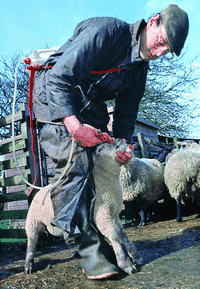Consumers trust farmers for food production info

Farmers are perceived as one of the most trusted sources of information by consumers when it comes to how meat, milk and eggs are produced.
This reassuring finding forms part of a 1000-person survey commissioned by the National Office of Animal Health (NOAH) into consumer attitudes towards the use of animal medicines and vaccines.
The aim of this research – conducted by the Institute of Grocery Distribution in late 2006 – was to explore the public’s  awareness and concerns over the use of pharmaceuticals in food production.
awareness and concerns over the use of pharmaceuticals in food production.
It found that consumers are not overly concerned about the use of medicines and vaccines in farm animal husbandry and, of those questioned, 58% were aware that stock are vaccinated regularly and treated.
“Just 24% of the people we surveyed weren’t aware that pharmaceuticals were used in food production,” says NOAH’s Alison Glennon.
“Most understood the importance of treating sick animals and preventing disease spread. However, there was some confusion: Some muddled preventative medicines with growth hormones.”
In demographic terms, those who lacked any awareness tended to fall into the lower end of the socio-economic spectrum and pay-scale. Those under 35 and those in the south of England displayed the greatest ignorance.
NOAH puts this down to a lack of interest in how food is produced. In the main, participants said they wanted reassurance from those they trust that their food is safe and hygienically prepared.
The Food Standards Agency was recognised as the most trusted body, with a third of those interviewed citing it as their preferred information source.
And, despite the occasional bad press, the survey revealed farmers – alongside supermarkets – are relatively well regarded as a source of information on food production, more so than food processors, butchers and scientists.
| Attitudes to medicines |
|---|
|
| What is NOAH? |
|---|
| The National Office of Animal Health represents the UK animal medicine industry. Its members are claimed to supply over 90% of the UK’s licensed animal health products. If you are a dairy producer you may well have received the product of one of its latest initiatives – a poster to help farmers ensure their milk meets stringent antibiotic milk residue standards. |
